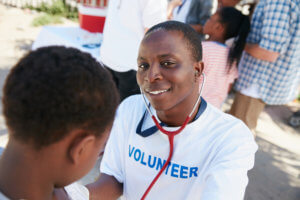10 Jul Where to Volunteer as a Phlebotomist
Using your phlebotomy skills to volunteer is a great way to support your community. You can learn more and get better at your job. Whether you’re new to the field or an experienced professional, volunteering offers a unique opportunity to make a difference in the lives of others.
By offering your expertise, you not only help those in need but also demonstrate your commitment to your craft, which can be valuable in your career. Volunteering can also show employers that you practice and care. Let’s explore some rewarding places where you can volunteer as a phlebotomist.
Why Volunteer as a Phlebotomist?
Volunteering lets you gain experience, work with different patients, and support important causes. It can boost your job satisfaction by giving you a sense of purpose. It also helps you develop communication and empathy, which are essential in patient care. Plus, it looks great on your resume and makes you a stronger job candidate.
Local Hospitals and Clinics
Volunteering at local hospitals lets you work directly with patients. This helps you get better at drawing blood and talking to others. You’ll meet different types of patients, like those who are nervous. Working with them can make you more confident and better at caring for all types of people.
Pros:
- Getting to work with patients and seeing many health issues.
- Meeting and learning from other health workers.
- Using new medical tools and information.
Community Blood Drives
Lots of blood is needed to help people who are sick. This is done through blood drives. By helping at these drives, you can help people who need blood. Local groups, schools, or big blood banks set up these drives. Helping here lets you practice taking blood. Plus, you can tell people how giving blood can save lives.
Pros:
- Getting to practice in a safe place.
- Meeting people from different places.
- Learning how to lead by helping set up blood drives.
Homeless Shelters
Homeless shelters help people who often don’t see doctors. Helping there makes a big difference for those who need it. You’ll work with people who have different problems. Some might be scared of doctors or have trouble getting health care.
Pros:
- Helping people who are often overlooked and making them feel better.
- Learning to adjust and getting to know different ways of life.
- Seeing many different health issues.
Mobile Health Clinics
Mobile health clinics go to places where it’s hard to find a doctor or hospital. They help in countryside areas, poor places, or where disasters have happened. By helping here, you can give care to those who might not get it. This work also teaches you to do your job in different and sometimes tough situations.
Pros:
- Meeting many people with different health problems.
- Learning to adjust by working in many places.
- Work with a team of trained health experts.
Assisted Living Facilities
Assisted living facilities help older people with everyday things. By helping there, you can feel good working with older folks who might be sick. You get to know them and help keep them healthy.
Pros:
- Having special experiences with older people and feeling fulfilled.
- Learning to be kind and understanding.
- Getting to know the special health care older people need.
Correctional Facilities
Helping in jails or prisons as someone who draws blood is special. You make sure those locked up get quick medical care. It’s very important for them to have regular health checks and blood tests.
Pros:
- Seeing different health problems that are common in jails.
- Working in a place with clear rules and safety.
- Making life better for those in jail.
International Development Agencies
If you like adventure, traveling, and drawing blood, think about helping global groups. Right now, many charities help with health in poorer countries. They need medical helpers like you to join them.
Pros:
- Opening your mind to different ways of life.
- Improving health in places that really need it.
- Learning to adjust to new situations.
Being a volunteer phlebotomist is a great thing to do. You’ll change people’s lives while learning a lot. This can also help you receive more job opportunities. There are many places to help, and each gives you different skills. People will be thankful for what you do no matter where you go.
Volunteering as a phlebotomist offers a valuable opportunity to contribute to your community and make a positive impact on the lives of others. Whether you choose to volunteer at local healthcare facilities, community events, or nonprofit organizations, your skills as a phlebotomist are highly sought after and can benefit those in need. By exploring the various volunteer opportunities available, you can find a fulfilling way to give back while furthering your professional development.
At Phlebotomy Training Specialists, we encourage our students and graduates to seek out volunteer opportunities as a way to enhance their skills and give back to the community. Volunteering not only enriches your experience but also helps you build connections within the healthcare field.


